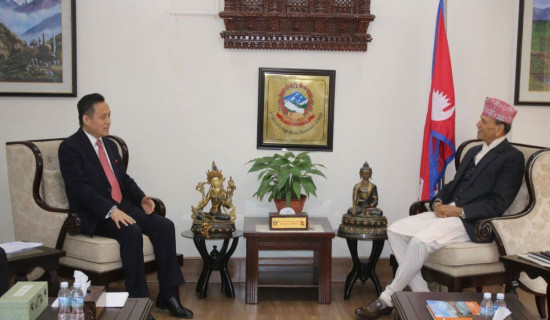- Thursday, 26 February 2026
Gen Z Revolt And Political Trajectory
The Gen Z-led September 8–9 protests stunned political elites and pundits alike. A demonstration against the ban on social media, corruption, instability, and recycled leadership escalated into the most destructive upheavals in Nepal’s history. Government offices, courts, businesses, media houses and even the homes of senior leaders of major political parties were burnt. The death toll, 19 in a single day, was unprecedented. A new nine-member government has emerged. Yet challenges continue to unfold. The youth had planned a peaceful protest, but their efforts were hijacked by vested groups, which quickly devolved into vandalism, looting, and arson. Infiltration caused the loss of 74 lives and gripped society by fear. The movement has opened a Pandora’s Box.
The gravest challenge lies in the constitutional quagmire. The new government rests on shaky legal ground: The constitution does not allow the president to appoint a prime minister (PM) who is not a sitting member of parliament. Unless the judiciary bends under public sentiment unleashed by the uprising, any writ petition would almost certainly nullify the president’s move. If the court overturns the appointment, Nepal risks plunging into yet another cycle of political anarchy. The scheduled federal elections of March 5, 2026, if held, would merely reproduce the same parliamentary arithmetic, empowering provincial assemblies and a federal legislature to elect a PM. This directly collides with Gen Z’s core demand for a directly elected PM.
Promises
The uprising has just toppled the Oli-led government. The rest of the state machinery is intact. If elections are not held credibly, the revolution may collapse like a bubble. Nepal stands in a peculiar twilight: the constitution survives, but the legislature lies dormant. In this paradox, how can the new government legislate or amend laws essential to satisfy Gen Z’s demands—restoring law and order, forming a high-level commission to probe the atrocities committed during the movement, and prosecuting looters, vandals, and arsonists? The Gen Z faithful seem to believe that regime change alone guarantees deliverance. Without repealing or reforming a host of existing laws, the government cannot legally deliver on the movement’s promises. The young protesters appear misled by advisors who confused rebellion with reconstruction.
The Gen Z uprising has bred a dangerous illusion among protestors—that it has obliterated Nepal’s traditional political order. But the edifice of power remains. Only the Oli-led government has been toppled, and a few compromised leaders from the Nepali Congress (NC), the Communist Party of Nepal–Unified Marxist Leninist (CPN-UML), the Maoist Centre, and the CPN Socialist have been politically incinerated. The parties remain structurally intact. The movement has felled only those grandees who thrived on nepotism, corruption, authoritarian instincts, and the cult of septuagenarian strongmen. Yet their fall clears the stage for a second-generation leadership that now has an opening to recalibrate party structures and reclaim credibility.
By contrast, the biggest casualty of this movement is the Rastriya Swatantra Party (RSP). Once heralded as an ‘alternative force,’ RSP has been unmasked as a fragile coalition of defectors. Its president, Rabi Lamichhane — implicated in multiple corruption charges — was sprung from jail by a mob. It turned him into a fugitive-hero, but juxtaposed with Rajiv Gurung (alias Deepak Manange), who refused mob-led release, the RSP’s credibility plummeted.
Lamichhane’s next gamble — to orchestrate the en masse resignation of all 21 RSP parliamentarians—boomeranged disastrously. The ploy, intended to destabilise the government and re-enter as a kingmaker, backfired when the president dissolved the parliament. Opportunism was laid bare. Politically gutted, the RSP’s claim of being a ‘new force’ has been hijacked wholesale by the Gen Z movement. Worse, the party squandered its capital by dedicating resources to defend its tainted president. Months of disruptive protests and signature campaigns to intimidate the judiciary alienated ordinary citizens and set dangerous anti-political precedents.
The already cash-strapped nation faces yet another cycle of profound economic distress. The estimated loss from the collateral damage is Rs 3 trillion and 10,000 jobs, yet the full scope of the loss will continue to unfold over time. The unprecedented loss pushed the country back at least a decade. Furthermore, billions of rupees will be required to conduct elections for the federal parliament, while the urgent priority should be service delivery and reconstruction.
The 9/9 protest is the most catastrophic. The state, private, and personal property were destroyed in less than 10 hours. Infiltrators indulged in looting, vandalising, and torching Singha Durbar, International Convention Centre, the Supreme, Special and District Courts, Office of the Attorney General, PM’s and President’s residences, ministers’ quarters and media houses. Private enterprises, including Bhatbhateni’s 21 department stores, and the houses of leaders of the NC, UML, Maoist Centre and Unified Socialist were set on fire.
Notably, no property belonging to RSP leaders was harmed. Government offices and courts associated with ongoing trials, including that of Lamichhane, were destroyed. The government must immediately establish a high-level investigation commission to identify and prosecute the perpetrators. The guilty should face life stringent punishment. This is a crime against the state. Failure to punish them decisively risks emboldening future offenders.
Courage
Gen Z brings courage, enthusiasm, and commitment but lacks political acumen. With inexperienced Gen Z leaders hesitant to command government bodies, former bureaucrats will fill the vacuum. Recent events show you have been ill-advised, and the consequences may be profoundly negative, inflicting irreparable harm on the nation and its citizens. Wake up: include more peers in all decision-making structures and resist misguided advisers. The path ahead demands prudence and resilience.
(Sedhai is a freelance writer.)







-square-thumb.jpg)





-original-thumb.jpg)


